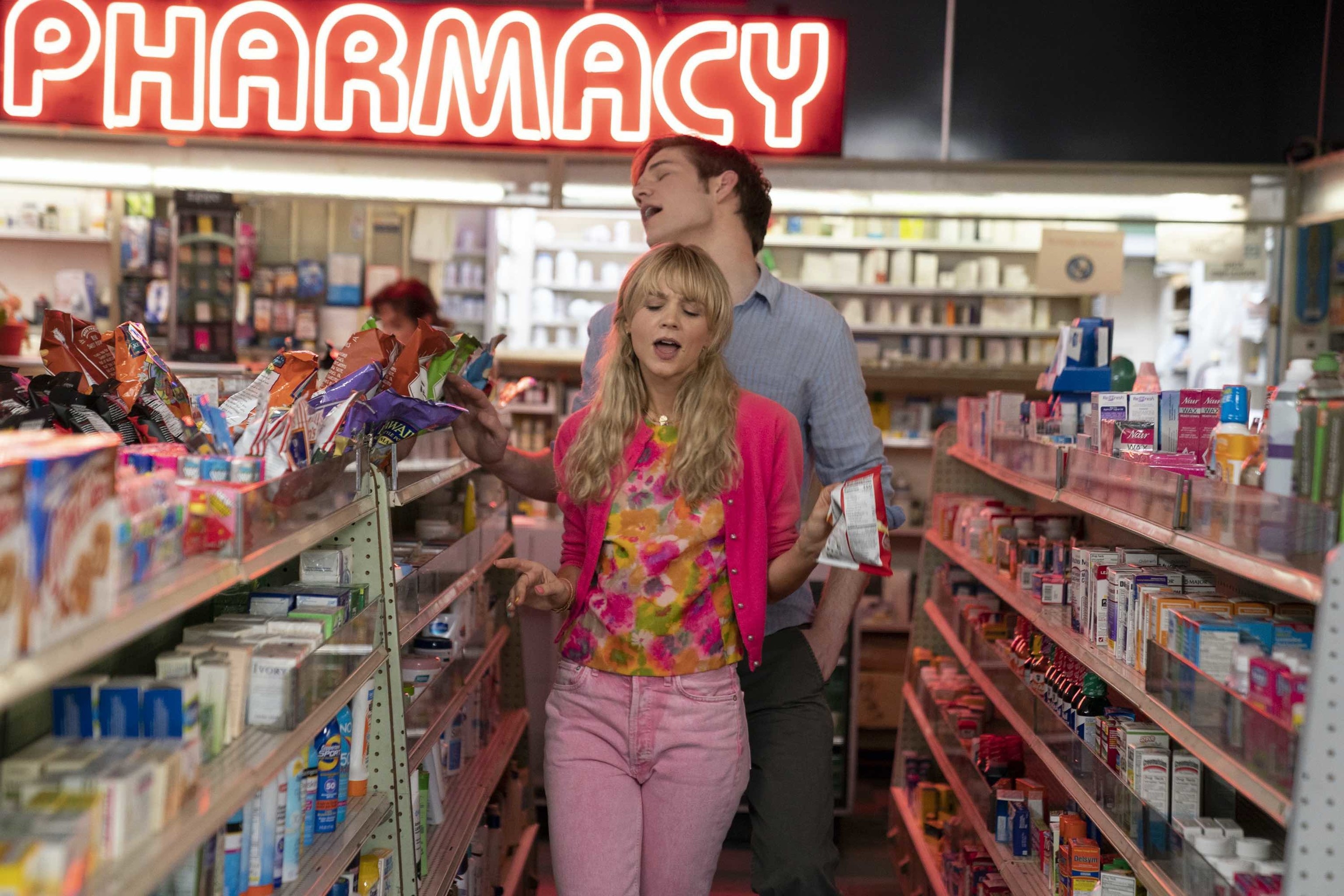
Acts of revenge take on deeper meaning when they are committed not for purely personal reasons, but as a way to address a deeply ingrained cultural imbalance. That’s why the plot of a woman taking back her power after undergoing harm or trauma — and metaphorically kicking patriarchy’s ass — is such a popular movie genre.
Over the last few decades, we’ve seen protagonists strike back through literal martial arts (à la Kill Bill) and in liberating, friends-on-the-lam road trips (Thelma & Louise). Writer and director Emerald Fennell’s debut film Promising Young Woman, wraps its own tale of vengeful transgression in a hyper-femme world of rom-com conventions and aughts bubble gum pop.
The title refers to Cassie (Carey Mulligan), a once-promising med student who has dropped out of school. She’s overwhelmed with grief and trauma after her friend Nina was sexually assaulted and, we are meant to assume, died by suicide afterward.
Cassie seeks justice for Nina by becoming a kind of emotional vigilante. (Not by starting a true crime podcast — this is a very aughts story.) She goes to clubs and pretends to be drunk to entice and shame predators, and sets up a series of traps to confront the people — and really the systems — that failed Nina. She’s not even necessarily seeking to punish them, but to prompt these bad actors into self-reflection. Still, she puts herself more and more at risk until the film’s deadly culmination.
Like Thelma & Louise, whose protagonists drive off a cliff in a much-debated climax, Promising Young Woman has already inspired plenty of debate about its own ending, described by some as queasy, hollow, subversively disappointing, and others as the best part of the movie. (It premiered in Sundance last year, but has been available on demand since Jan. 15.)
But the film’s dark portrait of trauma stands out not so much because of its ending, but because of its playfully skeptical gaze on aspirational, upper-middle-class whiteness. By treating that sector as a subculture with its own values, and exploring its reactions to sexual assault, the film exposes how even straight white women uphold the status quo.
And amid the endless parade of banal Hollywood stories that brand even white supremacist sympathizers as feminist empowerment icons, Promising Young Woman’s nonredemptive portrait of the way power works feels especially urgent.

We first meet Cassie on the eve of her 30th birthday, after she’s returned home from med school and is living with her concerned, but aloof, parents. She’s taken a minimum wage job as a barista, where her friendly boss (played by Laverne Cox in a lazily written ancillary role) encourages her to be more ambitious.
But it’s clear that Cassie’s real occupation is avenging her best friend, which involves ensnaring sexual predators she meets in clubs in her revenge plot. The movie opens with one such scenario, which Fennell said was the genesis of the film. A disheveled Cassie sits on the sidelines of the dance floor, as a bunch of overgrown frat guys survey her calculated disarray and a dorkier, nice one (Adam Brody) offers to share a cab ride home.
Once they get back to his apartment, which she tellingly didn’t actually agree to do, this guy, like all the ones she entices, crosses her boundaries, going down on her without her consent. She “wakes up” from her stupor and demands to know what he’s doing. He immediately turns apologetic.
The film makes sure to point out — in a number of these vignettes — that even the kind of guys who think of themselves as good people and feminist allies can be predators. It’s the kind of on-the-nose, think piece–bait commentary that is likely why the movie has been described as a bit of a feminist PowerPoint. (Which isn’t to say the film is without humor; when one of the guys says, “Why do you wear so much makeup? I want to see you, the real you, freckles and imperfections,” I chuckled.)
Interestingly, Cassie never calls the police on her perpetrators or publicly shames them. She models a less carcerally influenced emotional vigilantism.
Interestingly, Cassie never calls the police on her perpetrators or publicly shames them. She models a less carcerally influenced emotional vigilantism, where she is simply satisfied with forcing these men to confront their own violence and acknowledge the superficiality of their own, supposedly enlightened masculinity.
And it’s not just men whom she’s seeking to wake up from toxic gendered values. Cassie sets up traps for people representing the institutions that failed Nina, including other women, like a school dean to whom Nina reported her assault to, and a girlfriend who victim-blamed Nina.
They all have varying excuses for their behavior. The dean, played with smug lean-in condescension by Friday Night Lights’ Connie Britton, couldn’t even remember the report of Nina’s assault, and says the accused man (named Al) is upstanding. The friend, Madison (played by Alison Brie — who seemingly channels a Real Housewife), says nobody took sexual assault seriously back then. (Fennell is a millennial and you can tell the film is partly her reckoning with the slut-shaming culture we grew up with in the aughts; signals to that era include the soundtrack’s use of a darkened version of Britney Spears’ “Toxic” and a rendition of Paris Hilton’s lone hit, “Stars Are Blind.”)
Through these scenes, Promising Young Woman illustrates the power that even cis white women — like Nina, and by extension Cassie — lose when sexual violence casts them out of their “promising” position in society. Suddenly, even other upper-middle-class white women who buy into the promises of institutions (whether academia or the heterosexual family) are no longer natural allies.
In the film, both the institutions of the faithful wife and motherhood get weaponized against these women. Cassie sets up situations — getting Madison drunk and making her believe she might have been raped, luring the dean’s daughter into her car with the promise of meeting a music star — in order to get these women to rethink their biases around their own vulnerability.
The film itself is something of a trap, seducing viewers to keep watching with its own cute romance subplot. Cassie lets her walls down a bit and starts falling for another nice guy (Bo Burnham) from her med school days. In one especially memeable scene, Ryan sings “Stars Are Blind” to her at a drugstore, the kind of pleasurably gooey moment that rom-coms often follow with a montage of those characters falling into hetero-couple bliss.
But given the film’s focus, you’re left wondering how this nice guy will eventually get exposed as a perpetrator himself. His unmasking is just one more disappointment before the real, controversial, ending.

Promising Young Woman’s ending has generated lots of debate, so it’s impossible not to spoil it. Final spoiler alert: Nina pretends to be a hired stripper for Al’s bachelor party. She ties him up and tries to confront him about what he did to Nina — mostly to scare him — and threatens to carve Nina’s name on his body. But he smothers her with a pillow and actually murders her.
It’s a powerful, quiet, scene, which Fennell has said she actually timed to accurately convey how long it would take to smother someone to death.
The controversy over the ending has mainly been about whether Cassie intended to die. But Cassie is not a traditional, rounded character, and the movie doesn’t really invite us to read her death in individualizing, existentialist terms. In some ways, she’s supposed to be just a generic “promising young woman,” and the movie asks us to think of her death more politically: in terms of which lives society deems valuable and those it doesn’t.
In some ways, she’s supposed to be just a generic “promising young woman,” and the movie asks us to think of her death more politically: in terms of which lives society deems valuable and those it doesn’t.
This is made especially clear with the story’s actual culmination. In a trope familiar to any true crime fan — where husbands murder their wives and claim they were suicidal when they are reported missing — both Cassie’s father and Ryan, the nice-guy boyfriend, describe her as unstable. (The dad’s complicity with the boyfriend, and the cop’s view, really highlights the violence of the family as an institution.)
But Cassie knew that cops — and even her potential allies — would not look out for her. So she’s sent a letter to a defense attorney — one of the people she visited in her reckoning, who confessed to scouring social media accounts to discredit rape accusers — to make sure he would look out for her.
And the movie’s real ending comes when Al gets arrested at his wedding — not for Nina’s assault, but for Cassie’s murder. But the police arrive kind of clumsily and late, and this isn’t necessarily a triumphant celebration of justice. It’s more that Cassie turns herself into a dead white woman because she makes the calculation — or at least Fennell did — that dead white women are taken more seriously by law enforcement.
One of the final scenes of the movie shows the friendship necklace between Cassie and Nina, turning the story into a celebration of female friendship, not unlike Thelma & Louise. Cassie — and to a lesser degree, Nina — take their place alongside other white women who have, after being sick of feeling vulnerable, at least tried to control the way they exit the patriarchy. (Thelma & Louise, incidentally, came out 30 years ago in the midst of a white feminist reawakening in the wake of the Reagan era, just as Promising Young Woman comes in the wake #MeToo and a reality TV president.)
Yet Fennell’s film feels part of a later wave of post-#MeToo content. #MeToo became a mainstream media moment by emphasizing white women’s trauma and sexual injury — as opposed to, say, workplace injuries or racist aggression. It became a mainstream rallying cry for change, because of the value placed on white women’s safety and anything that might transgress it. And much of the initial media coverage reproduced that framework.
Since then, other perspectives have come to the forefront. A show like Michaela Coel’s I May Destroy You, for instance, uses 12 episodes to provide a plethora of perspectives and nuance in its vivisection of sexual trauma and its aftermath — with everything from law enforcement and social media shaming brought in — all from a Black and queer perspective.
While Promising Young Woman is working through an earlier cultural moment’s conventions — revisiting aughts culture — in its own way, it’s also a commentary on the racial and class politics of #MeToo, rather than a symptom of them. It doesn’t try to instill hope or sell a cartoon version of power, or make another claim for the faux complexity of white aughts icons. Its dark, and simple, message is: If it’s this hard out there for injured cis white women, what hope is there for the rest of people cast out of power? ●
